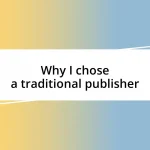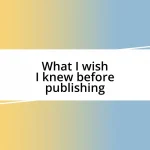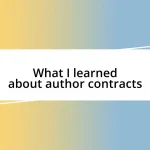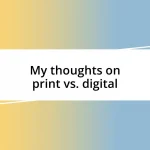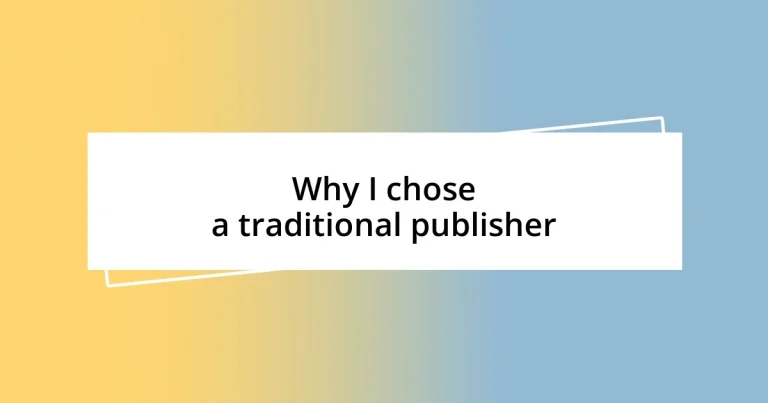Key takeaways:
- The credibility and validation from traditional publishing provide a significant boost for authors, along with access to professional resources and expertise.
- Networking opportunities and a sense of community within the literary world enhance an author’s growth and experience.
- Evaluating publisher offers should focus on long-term support and alignment with an author’s values rather than just monetary gains.
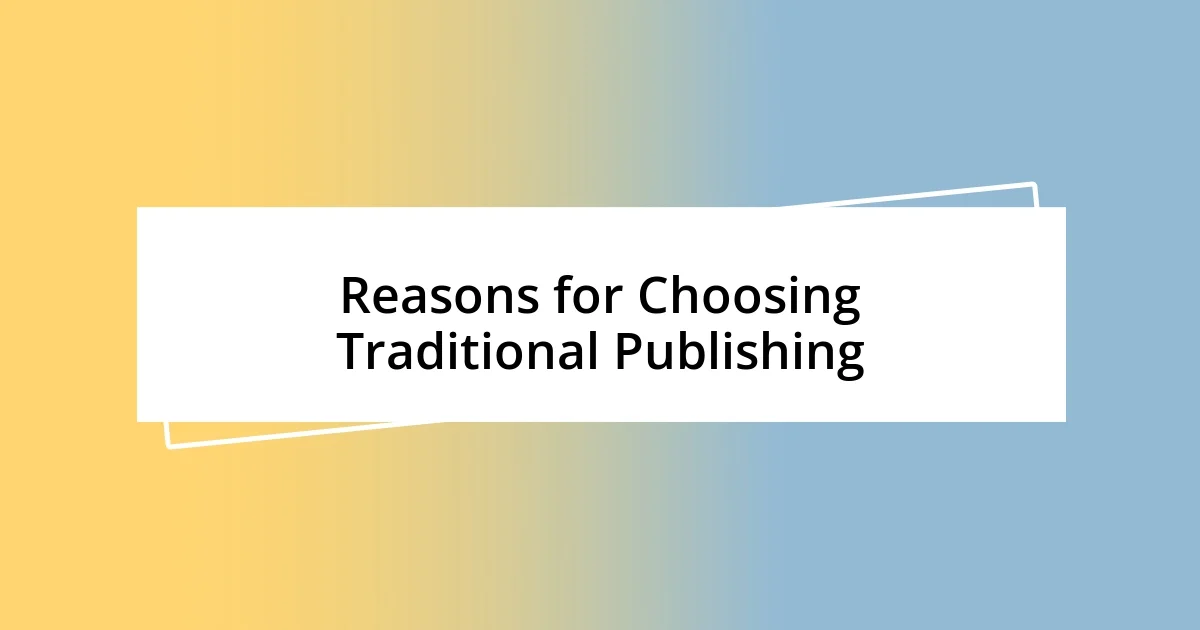
Reasons for Choosing Traditional Publishing
One of the primary reasons I chose traditional publishing was the credibility it brings. There’s something inherently reassuring about seeing your work endorsed by established industry professionals. I still remember the thrill of receiving my first acceptance letter; it felt like validation, as if all those hours spent writing and revising had finally paid off. Can you imagine the excitement of knowing your book will be available in bookstores—where readers might just stumble upon it?
Access to resources is another major factor. Traditional publishers offer a wealth of support, from editorial guidance to marketing expertise. When I first started out, the thought of navigating the intricate world of book promotion on my own felt daunting. The backing of a traditional publisher not only eased that burden but also connected me with a network of professionals who knew the ropes. It’s like having a mentor by your side, guiding you through the complexities of the publishing landscape.
Lastly, traditional publishing offers a level of distribution that self-publishing often struggles to achieve. I vividly recall visiting a nearby bookshop and spotting my book prominently displayed on the shelves—what a surreal experience! It’s this visibility that can help a book reach an audience I could never have tapped into by just publishing it myself. Don’t you think that having a dedicated team working to place your book in the right hands makes a world of difference?
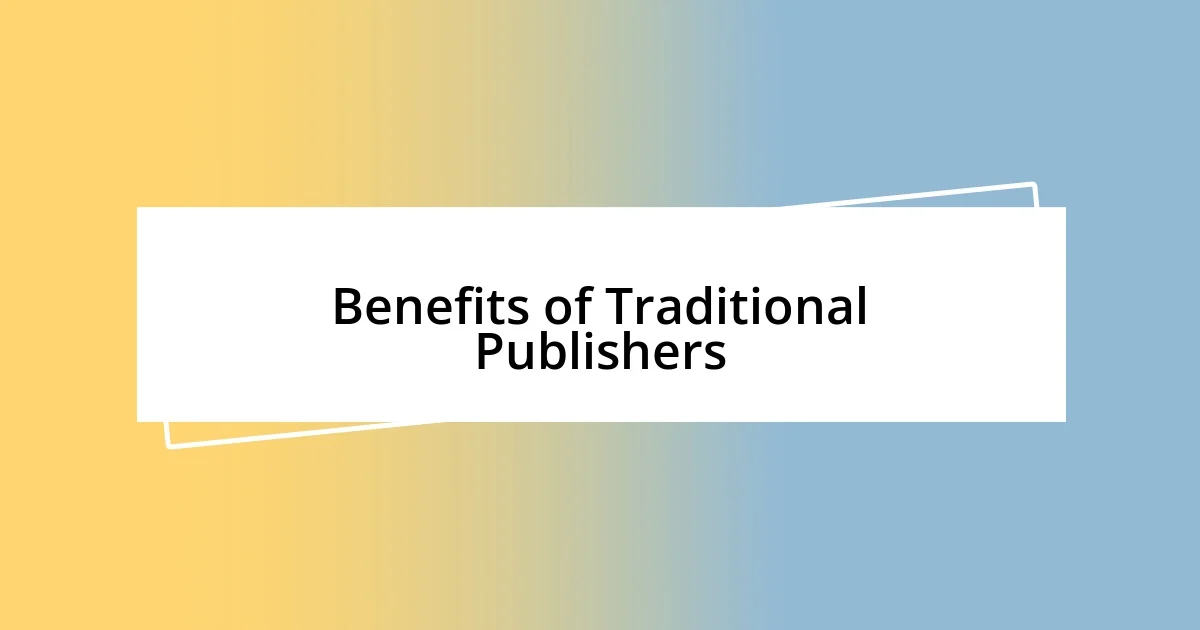
Benefits of Traditional Publishers
Although my own journey has been quite diverse, I’ve always felt that one of the most significant benefits of working with a traditional publisher is the professionalism they bring to the table. I remember sitting down with my editor for the first time and realizing just how much expertise was at my disposal. The feedback I received wasn’t just constructive; it was transformative. Each suggestion helped mold my manuscript into a polished work that I never could have achieved on my own. It’s incredible how a professional touch can elevate your writing to new heights.
Another notable advantage is the marketing power that traditional publishers wield. I can still picture the excitement when I attended my very first book launch event, organized seamlessly by my publisher. They had a dedicated marketing team that not only arranged the event but also put together promotional materials, online campaigns, and even coordinated with bookstores and media outlets. The sense of support during this phase was overwhelming. I didn’t just feel like an author; I felt like a vital part of a team invested in my success.
Finally, traditional publishers often create a sense of belonging within the literary community. I often think back to the networking opportunities I gained through publisher-hosted events and conferences. Those connections were invaluable; it’s like being thrown into a vibrant tapestry of ideas and inspiration. Seeing authors, agents, and editors come together in such passionate discussions reminded me that I was part of something greater. It’s a feeling that surely enhances not only my career but my love for writing itself.
| Benefit | Description |
|---|---|
| Professional Guidance | Access to seasoned editors who enhance the quality of your manuscript. |
| Marketing Support | Professional marketing teams that handle everything from launches to promotions. |
| Networking Opportunities | Building connections within the literary community through events and conferences. |
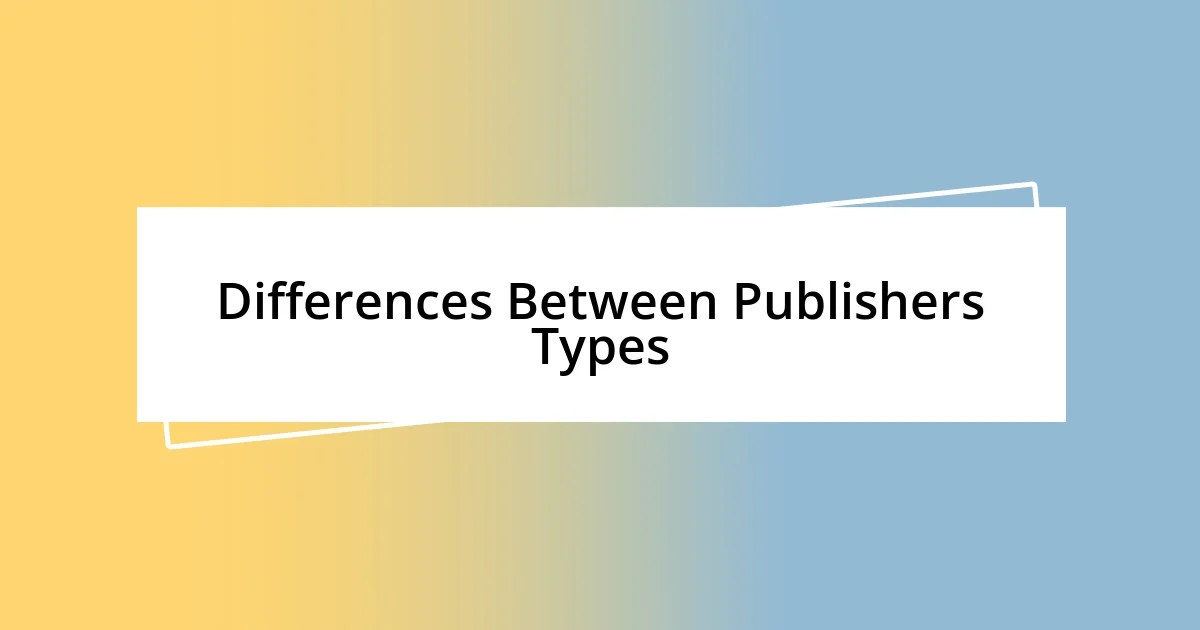
Differences Between Publishers Types
The distinctions between publisher types are crucial to grasp if you’re considering your publishing route. Traditional publishers, for instance, typically offer a comprehensive package that includes editorial assistance, marketing, and distribution. In contrast, self-publishing provides more creative control but can leave you managing everything from design to marketing on your own, which can feel overwhelming at times.
Here’s a quick breakdown of the differences:
-
Traditional Publishers:
- Provide extensive resources and support.
- Handle distribution, making it easier to get your book into bookstores.
- Offer editorial guidance from industry professionals.
-
Self-Publishing:
- Gives authors complete creative freedom.
- Requires authors to take on marketing and distribution responsibilities.
- Often has lower upfront costs but high personal investment in time and effort.
In my experience, navigating these options can be daunting. I recall my initial hesitation when contemplating self-publishing; the thought of juggling multiple roles was intimidating. Ultimately, the reassurance that came with having professionals in my corner was just what I needed to bolster my confidence and navigate the publishing waters effectively.
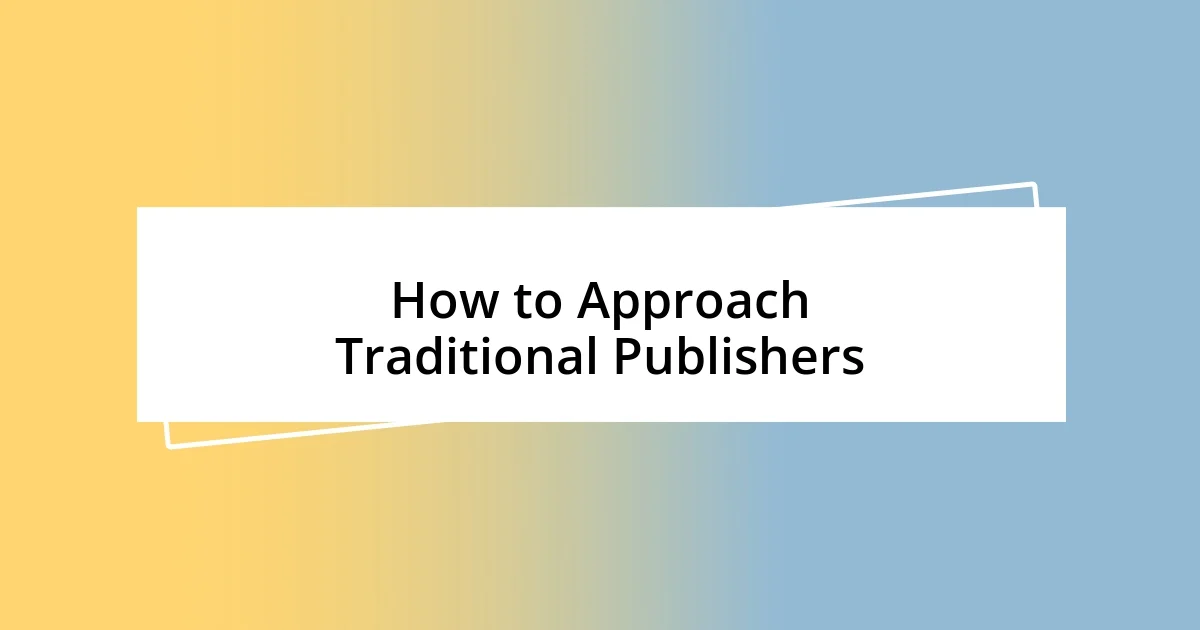
How to Approach Traditional Publishers
When approaching traditional publishers, the first step is often to research the right fit for your manuscript. I remember meticulously going through publisher websites, looking for genres they specialized in and their submission guidelines. Each requirement felt like a puzzle piece, and understanding how my work aligned with their mission made the process both thrilling and rewarding.
Crafting a compelling query letter is another critical element in this journey. I spent hours perfecting mine, infusing it with my passion for the story and why it mattered. It wasn’t just about selling my book; it was about sharing a piece of my heart. I think back to the moment I hit send, and I felt a mix of excitement and anxiety. Did I really capture what made my story unique?
Finally, following up is essential. After submitting, I learned that patience was key, but that doesn’t mean sitting still. I found it helpful to check in politely after a few months. Once, a gentle nudge led to a meaningful conversation with an editor, one that ultimately reinforced my belief in my manuscript. It’s fascinating to think how these small efforts can create profound connections, isn’t it?
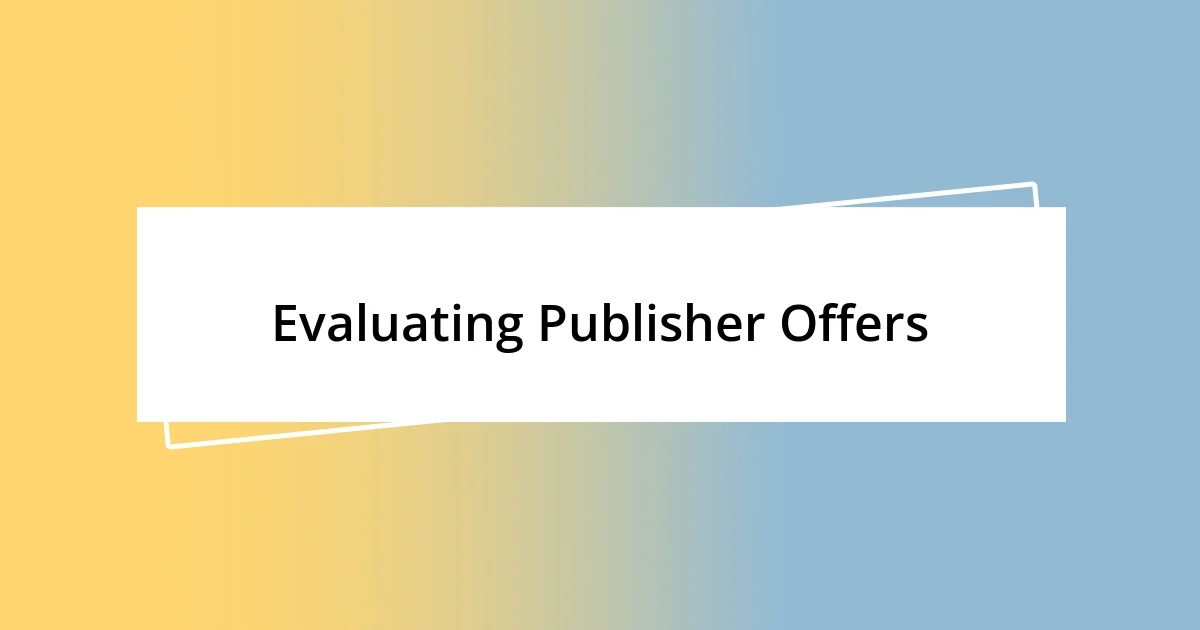
Evaluating Publisher Offers
Evaluating publisher offers requires careful scrutiny of the resources and support they provide. When I received my first offer, I analyzed it like a contract lawyer—trying to discern what was truly on the table. Did they have an established marketing strategy? Were they well-connected in the industry? Understanding these aspects made me realize that an impressive offer was about more than just upfront monetary gains; it was about the long-term partnership I could build with them.
Another vital factor was the royalty rates offered. I distinctly remember feeling a mix of excitement and apprehension when I compared different offers—some were significantly higher than others, but I had to ask myself: what did that really mean? A higher royalty might sound appealing, but if it came with less marketing support, would it actually benefit my book in the long run? I learned that it’s essential to weigh potential earnings against the level of professional backing that a publisher can provide.
In the end, I discovered that the best offer was one that aligned with my values as an author. I think back to my discussions with various representatives, feeling the direct impact of their passion for storytelling and commitment to nurturing talent. This emotional connection was something I never expected to be a deciding factor, but it ultimately became clear: trust and alignment were non-negotiable for me in evaluating offers.
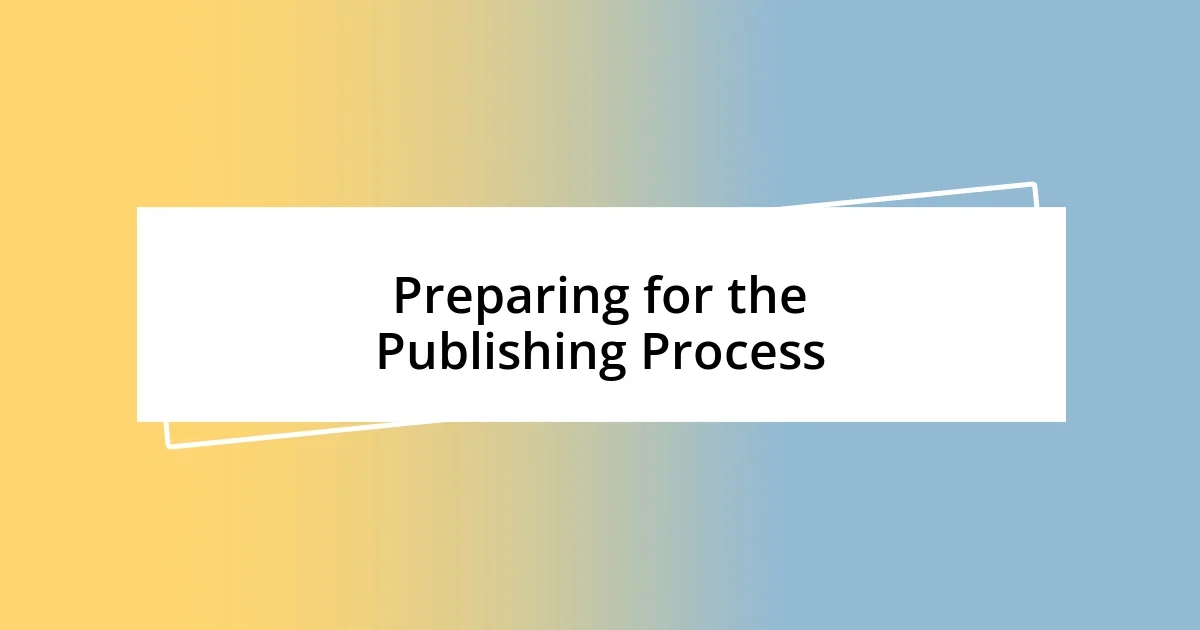
Preparing for the Publishing Process
Preparing for the publishing process can often feel intimidating, but it’s also an exhilarating time. When I first set out, I made a list of my goals and what I wanted from a publisher. This process was enlightening—what kind of support did I really need? Reflecting on my priorities helped shape the direction of my research and submissions.
Creating a timeline was another essential step for me. I vividly remember mapping out milestones, from finishing my manuscript to submitting it and preparing for potential revisions. By breaking it into manageable steps, I found myself feeling more in control. How can you not feel a surge of motivation when you see your progress laid out before you, right?
I also discovered the importance of networking during this phase. Engaging with fellow authors and industry professionals at events was a game changer for me. One conversation led to an unexpected introduction to an editor who ended up being instrumental in my publishing journey. It’s amazing how simply putting yourself out there can open doors you never knew existed. Isn’t it fascinating to think about the connections we can create?


